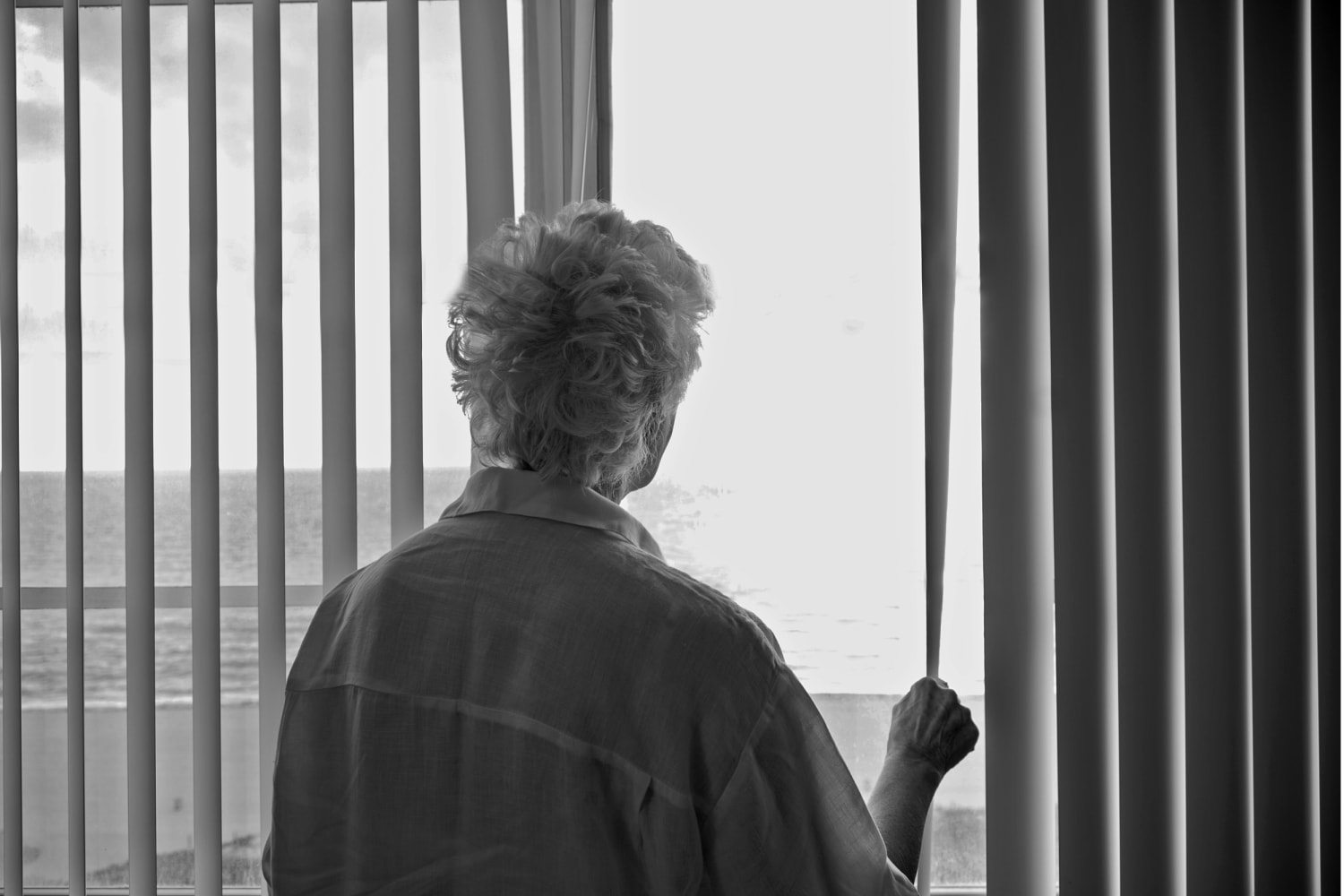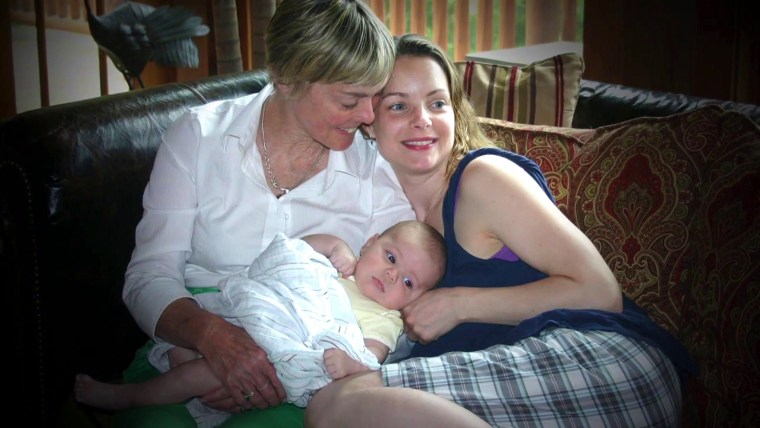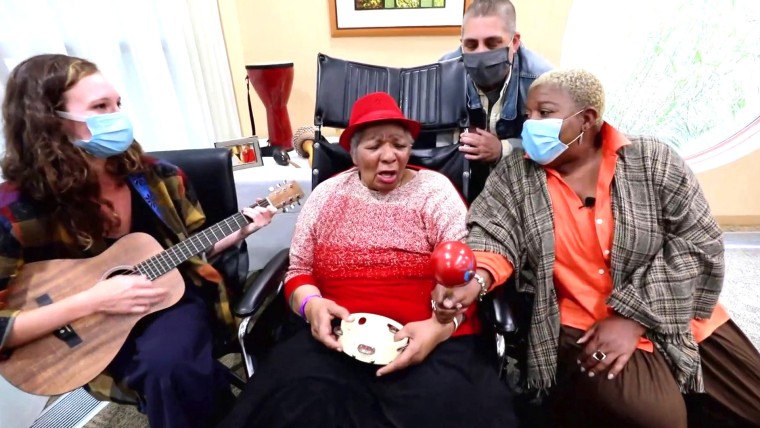The recent discovery of a gene that may explain why women are at higher risk for getting Alzheimer’s disease made me think of a question I asked myself while on a flight from Boston to Denver: How do we care for a loved one who has Alzheimer’s?
For two weeks, I would be looking after my dearest friend and sister, Sandi, who’d been recently diagnosed.
Even the more painful memories that bound us together, I wanted her to keep.
Within the first week, one thing became clear: “Don’t you remember…” is the wrong question to ask. Trying to jog Sandi’s memories was tempting, but I soon realized that the best way to care for a loved one with Alzheimer’s is to stay in the moment with them, no matter how many times that moment gets repeated. On my flight to Denver, I had been reading Megan Carnarius’ “A Deeper Perspective on Alzheimer’s and Other Dementias,“ and this stuck: “If you have not already…please stop using the phrase, ‘Do you remember?’…try using the phrase, ‘I remember when…’ and retelling the story you want to convey…They can enjoy your story as if it is new.”
Still, in moments of frustration and sadness at the thought of losing the Sandi that I’ve always known, I had to remind myself repeatedly.
I wanted Sandi to recall things like when we first met. I was 16 when she blew into our house like a gust of fresh air. My older brother Paul had brought her home from college. Tan like the California girl she was, blue eyes that twinkled when she laughed, long light-brown hair that ran like silk down her back, Sandi was captivating. Paul was smitten. He asked her to marry him. She would become my sister-in-law, but eventually, “in-law” would be dropped when it came to Sandi. She was simply my big sister.
Even the more painful memories that bound us together, I wanted her to keep. Paul and Sandi were married for 4 ½ years, when after a year of unrelenting despair, he took his own life. I remember flying from my college in Washington to Cheyenne, Wyoming, and entering their little house. Sandi was curled up on the couch in the ivory afghan she’d crocheted, her eyes red and swollen. I hugged her and held on, hoping we could get through this together.
When I learned that Sandi had early-onset Alzheimer’s last year, I was too emotionally struck to speak.
For 50 years, she and I flew back and forth for visits. I met her new husband and watched her two sons grow up. She celebrated when I married my husband, Keith, in the Colorado mountains, hiking up to 11,000 feet with a homemade chocolate wedding cake. She took care of my toddler son while I recovered from breast cancer surgery.
She would become my sister-in-law, but eventually, “in-law” would be dropped when it came to Sandi. She was simply my big sister.
When my kids were 12 and 16, I discovered a cerebral aneurysm in danger of rupture, and while Keith was in Germany on business, Sandi flew to Boston to take care of my son and daughter who had the flu, so I wouldn’t have to postpone brain surgery. The craniotomy could cause me some cognitive impairment — transient or permanent memory loss.
“What if I don’t recognize you or the kids afterward?” I asked Keith.
“Then we will introduce ourselves daily, if necessary,” he said. “I think you’ll like us.”
I laughed, not knowing how often I would repeat this to Sandi.
After her diagnosis, we talked often. At times she’d forget our call time, and other times she’d lose words midsentence. I knew I was losing her.
When I offered to go and care for her and give her husband a break, it was my opportunity to thank Sandi for all she had done for me over the years, and a chance to reclaim her at a time when she still remembered me.
“Why are you doing this for me?” Sandi asked me on day two of my visit.
“It’s my chance to give back. When I had breast cancer––”
“You had breast cancer?” she interjected.
“Yes, and you helped me recover!” Brokenhearted, I tried to remain cheerful.
Remembering how music had helped my cognition after brain surgery, I had an idea. I asked her musician son if he had a portable keyboard. When it arrived, Sandi sat down, and I settled her fingers over the keys from C-G, teaching her the opening melody of Bach’s “Minuet in G.” She surprised me by singing the next part, so I asked her to find the next note by ear, which she did. She was laughing and having a great time, so I decided to make this part of our daily cognitive work. The next day, she forgot everything we’d done. Although I wrestled with the frustration of it, I taught her the same melody again. Each time she got it, Sandi beamed with joy. Starting over each day was worth it –– just to see her smile.
But her disabilities continually surprised me. On the third day, I overslept. Instead of me getting up first, making the coffee, cutting up fruit, and making her eggs with veggies, I smelled coffee coming from the kitchen. Looking around, I saw it was coming from the convection oven, where Sandi had put the coffee grounds into the egg pan to bake. She’d also poured hot water into an empty filter over the carafe, which still held the warm, clear liquid. I took the coffee grounds out of the oven and said, “Maybe we should start over on the coffee?”
Later that day, she approached me from her bedroom, carrying a rectangular carved wooden box.
“I have something for you,” she said. “It’s Paul’s old memory verse box with his handwriting on the back of each card.”
Here she was, bringing back another memory of Paul from long ago, something I have always treasured about Sandi. During his “Jesus Freak” days, Paul’s ambition was to memorize as much of the Bible as possible, one verse at a time. I took the box into the guest bedroom and randomly picked out a verse. On the back of it, I found Sandi’s clear and concise script instead of my brother’s illegible scrawl. I pulled out one card after another, each with Sandi’s handwriting on the back. Apparently, she’d given me her own memory verse cards from the time when she and Paul were together.
As I vacillated about saying something, Carnarius’ words swirled in the back of my mind. I decided against it. This was a gift from her heart, and who was I to tell Sandi it was the wrong box?
Carnarius’ book had given me a new way to approach things. But it was more than reading her book that moved my behavior. I have not forgotten the frustration of my own memory loss after brain surgery. Friends had come to visit me in the hospital, but I couldn’t remember. I remembered my kids saying, “Mom, you already asked me that!”
“Just answer the same question each time,” Keith admonished. “Mom can’t help forgetting.”
Eight days into my stay, I found Sandi shuffling through a large stack of papers at her dining room table, looking for something. She looked up at me, seeming puzzled by my appearance.
“Cheryl?” she said, then corrected herself. “No, that’s my sister.”
“Right,” I said. “The one you just talked with by phone yesterday.
“Tami?” she said.
“Your youngest sister?” I asked. “You talked with her, too, the other day.”
She continued to study me. Suddenly I remembered what Keith said to me when I was worried about not recognizing him after my brain surgery.
“I’m Linda,” I said to Sandi. “I think you’ll like me.”
“Lin!” she said, getting up to hug me.
I’m not sure how long she’ll remember my name, but I plan to fix that hug in my memory.
None of us, with Alzheimer’s or without it, knows how much time we have left. But in two short weeks, Sandi taught me this: laugh hard, hug often and stay present for every moment — before we forget and before we’re forgotten.
Source: | This article originally belongs to Nbcnews.com











